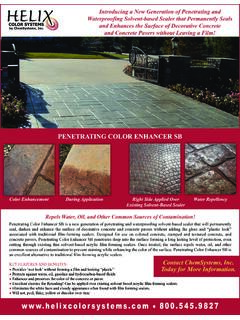Transcription of Conforms to OSHA HazCom 2012 & NOM-018 …
1 Conforms to osha HazCom 2012 & NOM-018 -STPS-2000 Standards Trade Name: PB penetrating Catalyst (Aerosol) Print date: 2016-02-03 Page 1 of 10 SAFETY DATA SHEET PRODUCT IDENTIFIER Product Name: PB penetrating Catalyst (Aerosol) Product Code: 16-PB, 8-PB, 8-PBS, PBTS, 20-PB, 16-PB-IND RECOMMENDED USE OF CHEMICAL AND RESTRICTIONS ON USE Use: Lubricant/Penetrant DETAILS OF THE SUPPLIER OF THE SAFETY DATA SHEET Name/Address: The Blaster Corporation 8500 Sweet Valley Drive Valley View, Ohio 44125 USA Telephone Number: T (216) 901-5800 F (216) 901-5801 EMERGENCY TELEPHONE NUMBER Emergency Telephone Number: CHEMTREC: (800) 424-9300 Date of Preparation: Feb.
2 3, 2016 Version #: CLASSIFICATION OF THE CHEMICAL ACCORDING TO osha HazCom 2012 Hazard class Flammable Aerosol 2 Gases Under Pressure (Dissolved Gas) Serious Eye Irritation 2A Carcinogenicity 2 Aspiration Hazard 1 LABEL ELEMENTS ACCORDING TO osha HazCom 2012 This product is a consumer product and is labeled in accordance with the US Consumer Product Safety Commission regulations which take precedence over osha Hazard Communication labeling. The actual container label will not include the label elements below. The labeling below applies to industrial/professional products. Hazard Pictogram: Signal Word: Danger Hazard Statement: Flammable aerosol. Contains gas under pressure; may explode if heated.
3 Causes serious eye irritation. Suspected of causing cancer. May be fatal if swallowed and enters airways. Prevention: Keep away from heat/sparks/open flames/hot surfaces. -No smoking. Do not spray on an open flame or other ignition source. Pressurized container: Do not pierce or burn, even after use. Wash hands thoroughly after handling. Obtain special instructions before use. Do not handle until all safety precautions have been read and understood. Wear protective gloves/protective clothing/eye protection/face protection. Section 1: IDENTIFICATION Section 2: HAZARD(S) IDENTIFICATION Conforms to osha HazCom 2012 & NOM-018 -STPS-2000 Standards Trade Name: PB penetrating Catalyst (Aerosol) Print date: 2016-02-03 Page 2 of 10 SAFETY DATA SHEET Response: If exposed or concerned: Get medical advice/attention.
4 If in eyes: Rinse cautiously with water for several minutes. Remove contact lenses, if present and easy to do. Continue rinsing. If eye irritation persists: Get medical advice/attention. If swallowed: Immediately call a poison center or doctor. Do NOT induce vomiting. Storage: Protect from sunlight. Do not expose to temperatures exceeding 50 C/122 F. Store in a well-ventilated place. Store locked up. Disposal: Dispose of contents and container in accordance with all local, regional, national and international regulations. ADDITIONAL INFORMATION Hazards not otherwise classified: Not applicable. 8 % of the mixture consists of ingredient(s) of unknown acute toxicity.
5 This product is a hazardous chemical as defined by NOM-018 -STPS-2000. Mexico Classification: Blue = Health Red = Flammability Yellow = Reactivity White = Special Hazard Rating: 0 = minimal, 1 = slight, 2 = moderate, 3 = severe, 4 = extreme MIXTURES Ingredient UN # H / F/ R / * CAS No Wt. % Distillates (petroleum), hydrotreated light Not available Not available 64742-47-8 50 - 60 Solvent naphtha (petroleum), heavy aromatic UN1270 Not available 64742-94-5 20 - 30 Distillates (petroleum), hydrotreated heavy naphthenic Not available Not available 64742-52-5 20 - 30 Carbon dioxide UN1013 1/0/0 124-38-9 1 - 5 Naphthalene UN1334/ UN2304 2/2/0 91-20-3 2 - 3 Dinonylphenol, ethoxylated, phosphated Not available Not available 39464-64-7 - The exact percentage (concentration) of composition has been withheld as a trade secret in accordance with paragraph (i) of * Per NOM-018 -STPS-2000 Section 3.
6 COMPOSITION/INFORMATION ON INGREDIENTS Conforms to osha HazCom 2012 & NOM-018 -STPS-2000 Standards Trade Name: PB penetrating Catalyst (Aerosol) Print date: 2016-02-03 Page 3 of 10 SAFETY DATA SHEET DESCRIPTION OF THE FIRST AID MEASURE Eye: In case of contact, immediately flush eyes with plenty of water for at least 15 minutes. If easy to do, remove contact lenses, if worn. If irritation persists, get medical attention. Skin: In case of contact, immediately flush skin with plenty of water. Remove contaminated clothing and shoes. Wash clothing before reuse. Call a physician if irritation develops and persists. Inhalation: If breathing is difficult, remove to fresh air and keep at rest in a position comfortable for breathing.
7 Get medical advice/attention if you feel unwell. Ingestion: If swallowed, do NOT induce vomiting unless directed to do so by medical personnel. Never give anything by mouth to an unconscious person. Get immediate medical advice/attention. MOST IMPORTANT SYMPTOMS AND EFFECTS, BOTH ACUTE AND DELAYED Eye: Causes serious eye irritation. Symptoms may include discomfort or pain, excess blinking and tear production, with marked redness and swelling of the conjunctiva. Skin: May cause skin irritation. Symptoms may include redness, drying, defatting and cracking of the skin. Inhalation: May be fatal if swallowed and enters airways. This product may be aspirated into the lungs and cause chemical pneumonitis.
8 May cause stomach distress, nausea or vomiting. Ingestion: May cause respiratory tract irritation. INDICATION OF ANY IMMEDIATE MEDICAL ATTENTION AND SPECIAL TREATMENTS NEEDED Note to Physicians: Symptoms may not appear immediately. Specific Treatments: In case of accident or if you feel unwell, seek medical advice immediately (show the label or SDS where possible). EXTINGUISHING MEDIA Suitable Extinguishing Media: Dry chemical, carbon dioxide or foam. Unsuitable Extinguishing Media: Water may be ineffective for extinguishing fire. SPECIAL HAZARDS ARISING FROM THE CHEMICAL Products of Combustion: May include, and are not limited to: oxides of carbon, hydrocarbons.
9 SPECIAL PROTECTIVE EQUIPMENT AND PRECAUTIONS FOR FIRE FIGHTERS Keep upwind of fire. Wear full fire fighting turn-out gear (full Bunker gear) and respiratory protection (SCBA). Cool closed containers exposed to fire with water. Do not use a solid water stream asit may scatter and spread fire. Containers may explode when heated. Section 4: FIRST- AID MEASURES Section 5: FIRE-FIGHTING MEASURES Conforms to osha HazCom 2012 & NOM-018 -STPS-2000 Standards Trade Name: PB penetrating Catalyst (Aerosol) Print date: 2016-02-03 Page 4 of 10 SAFETY DATA SHEET PERSONAL PRECAUTIONS, PROTECTIVE EQUIPMENT AND EMERGENCY PROCEDURES Use personal protection recommended in Section 8.
10 Isolate the hazard area and deny entry to unnecessary and unprotected personnel. Eliminate sources of ignition. METHODS AND MATERIALS FOR CONTAINMENT AND CLEANING - UP Methods for Containment: Contain and/or absorb spill with inert material ( sand, vermiculite), then place in a suitable container. Do not flush to sewer or allow to enter waterways. Use appropriate Personal Protective Equipment (PPE). Methods for Cleaning-Up: Scoop up material and place in a disposal container. Vapors may be heavier than air and may travel along the ground to a distant ignition source and flash back. Provide ventilation. PRECAUTIONS FOR SAFE HANDLING Handling: Keep away from sources of ignition.

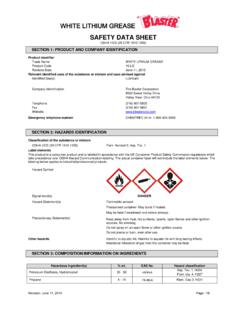

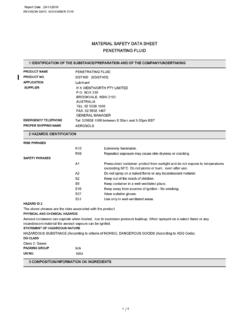
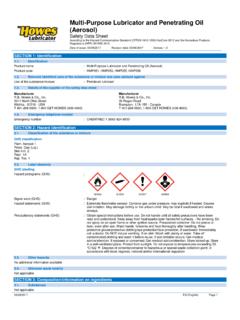

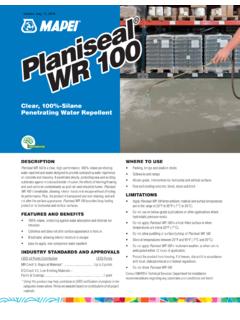

![Smith’s Clear Penetrating Epoxy Sealer [CPES] 3M …](/cache/preview/1/c/1/b/8/6/e/a/thumb-1c1b86ea56b9dd473657e7b011cd5822.jpg)
